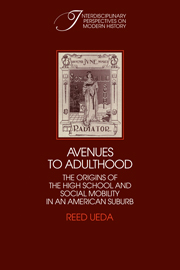Book contents
- Frontmatter
- Contents
- Acknowledgments
- Introduction
- 1 Farm village to commuter suburb
- 2 The evolution of educational leadership
- 3 The free high school
- 4 The rise of Yankee city and the prolongation of schooling
- 5 Popularizing high school: “the college of the people”
- 6 The origins of high school youth culture
- 7 Educational opportunity and social mobility
- 8 The birth of progressive reform and the junior high school
- Conclusion: The high school in the light of history
- Appendix I Courses of study
- Appendix II Sources and methods
- Appendix III Students and households
- Appendix IV Supplementary household data
- Notes
- Index
1 - Farm village to commuter suburb
Published online by Cambridge University Press: 04 August 2010
- Frontmatter
- Contents
- Acknowledgments
- Introduction
- 1 Farm village to commuter suburb
- 2 The evolution of educational leadership
- 3 The free high school
- 4 The rise of Yankee city and the prolongation of schooling
- 5 Popularizing high school: “the college of the people”
- 6 The origins of high school youth culture
- 7 Educational opportunity and social mobility
- 8 The birth of progressive reform and the junior high school
- Conclusion: The high school in the light of history
- Appendix I Courses of study
- Appendix II Sources and methods
- Appendix III Students and households
- Appendix IV Supplementary household data
- Notes
- Index
Summary
When George O. Brastow took the oath as first Mayor of the newly chartered City of Somerville in 1872, he crowned an Algeresque career that coursed this Boston suburb's avenues to business success and political power. The highest honor of the community he helped found in 1842 as a selectmen-run town went to the former country lad from the Massachusetts village of Wrentham. Brastow had risen an entrepreneur in Somerville's residential real estate boom and a Whig leader elected one of the town's first selectmen and school committeemen. Service in the Civil War interrupted his public career, but Brastow returned as a hero. The ambitious booster climbed to loftier heights as a Republican in state politics, winning terms as representative and senator, and serving as president of the Senate before his installation as mayor.
In his inaugural speech, the sixty-one-year-old civic patriarch looked back fondly on Somerville's “small and humble” childhood as a rural district of Charlestown that was partitioned into a township in 1842. He catalogued the streets, railways, water and sewer lines, fire and police departments: the ligatures developed by the vigorous growth of the suburban population. Above all, Brastow placed the public schools at the forefront of the civic accomplishments he unfurled before his rapt audience. The public schools, proclaimed Brastow, always served as the advance agents of “progress in wealth and population.” He praised the wisdom of his fellow citizens, who made Somerville highest among all Massachusetts towns in school expenditure per pupil for several years.
- Type
- Chapter
- Information
- Avenues to AdulthoodThe Origins of the High School and Social Mobility in an American Suburb, pp. 4 - 22Publisher: Cambridge University PressPrint publication year: 1987



